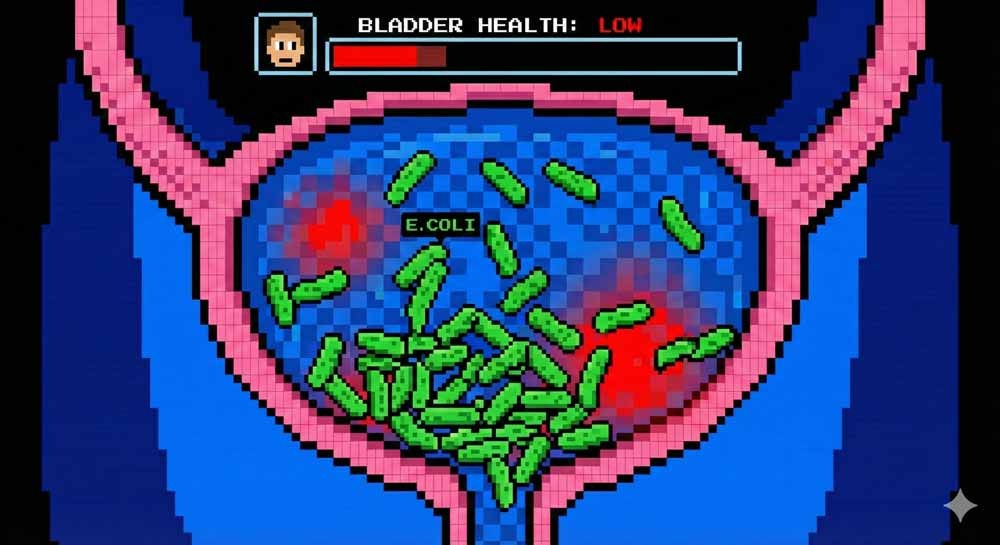Urinary tract infections (UTIs)
CONDITIONS
A guide to recurrent urinary tract infections
Urinary Tract Infections are among the most common conditions urological surgeons encounter in our practice. They can affect anyone but are notably more common in women. A deeper understanding of what causes UTIs and the need for investigation can empower patients in their treatment journey.
Understanding Urinary Tract Infections
What is a UTI? A UTI is an infection in any part of the urinary system, including kidneys, ureters, bladder, and urethra. Most infections involve the lower urinary tract — the bladder and the urethra.
Symptoms include a strong, persistent urge to urinate, a burning sensation when urinating, passing frequent, small amounts of urine, and cloudy or strong-smelling urine. If the infection reaches the kidneys, it might cause upper back and side pain, high fever, shaking, chills, nausea, or vomiting.
Recurrent Urinary Tract Infections
Some individuals experience recurrent UTIs, defined as having two infections in six months or three in one year. Recurrent UTIs can be frustrating and may require more extensive evaluation to understand their cause.
Causes and pathology
Bacterial Invasion: The most common cause of UTIs is the entry of bacteria, typically Escherichia coli (E. coli), into the urinary tract through the urethra, multiplying in the bladder.
Risk Factors: These include female anatomy, sexual activity, certain types of birth control, menopause, urinary tract abnormalities, blockages, a suppressed immune system, catheter use, and recent urinary procedures.
Need for Investigation
Investigating UTIs, especially recurrent ones, is crucial to prevent further complications like kidney infections or damage. Tests might include:
Urine Tests: To look for bacteria, blood, or pus in the urine.
Imaging: Ultrasounds, CT scans, or MRIs if recurrent infections to look for abnormalities or obstructions.
Cystoscopy: A camera to see inside the bladder and urethra, particularly if problems are recurrent or involve unusual symptoms.
Treatment Options
The following is a list of some of the therapies your urologist may discuss with you. They are divided into conservative which are dietary and educational therapies, medical, which involve tablets or creams and surgical.
Conservative options
Hydration: Increasing fluid intake can help flush out bacteria.
Cranberry Juice or Supplements: Though evidence is mixed, some believe it may prevent UTIs.
Proper Bathroom Habits: Including wiping from front to back in women and fully emptying the bladder when urinating.
Wearing loose-fitting underwear
D-mannose: a sugar supplement that is thought to prevent bacterial attachment to cells in the bladder
Medical
Methenamine hippurate: Proven equivalency in ALTAR trial vs antibiotic prophylaxis
Antibiotics: The mainstay of treatment. The type, dose, and duration can vary.
Pain Relief: To manage the discomfort during urination.
Preventive Antibiotics: For recurrent UTIs, a low dose of antibiotics for a longer period may be recommended. These can be given either at sexual intercourse (within 30 minutes) or for self-starting on the development of symptoms or regularly for 6-12 months. Taking regular antibiotics can have long-term consequences and checking your blood tests is recommended on at least a 3-monthly basis.
Oestrogen creams or pessaries: reduce the chance of having UTIs by changing friendly bacteria around the vagina
Surgical
Surgical intervention is considered when there are underlying abnormalities contributing to infections, such as:
Removal of Stones or Tumors: These might be causing blockages and recurrent infections.
Treatment of bladder outflow obstruction: typically in men with large prostates
Intermittent self-catheterisation for patients who are not emptying their bladders
Intravesical treatments: some treatments are delivered with installations of fluid in the bladder (GAG) replacement or antibiotics to prevent severe recurrent UTIs.
Managing Recurrent UTIs
Management includes identifying and modifying potential risk factors and considering the right course of treatment tailored for each patient.
Conclusion
UTIs can range from being a brief inconvenience to a source of recurrent distress. Understanding their causes, pursuing appropriate investigations, and discussing all available treatment options with your healthcare provider can lead to effective management and relief.
As a urologist, I aim to guide you through understanding your symptoms and treatment options to enhance your urinary health and quality of life. Your journey to recovery is our utmost priority, and we're dedicated to providing care tailored to your unique needs and circumstances. Get in touch today to see if we can help.
Mr Ivo Dukic is an experienced consultant urologist who offers personalised consultations in Birmingham, United Kingdom. Schedule an appointment with him for expert, bespoke advice through his Top Doctors profile or book an appointment through Harborne Hospital, HCA Healthcare, the Priory Hospital, Edgbaston, Circle Health Group or Droitwich Spa, Circle Health.


Have any questions?


If you have any questions or wish to make an appointment please get in contact.
Ivo Dukic
Contacts
e-mail: admin@ivodukic.co.uk
Telephone number for private patients:
0121 716 9046
(Mondays to Fridays 0800 - 18:00)
For NHS patients seen at University Hospitals Birmingham NHS Hospitals please get in contact on
0121 424 9011
(Mondays to Fridays 0900 - 17:00)
ivodukic.co.uk
© 2026 UrolSurg LTD


